1 Chronicles 14 meaning explained in AI Summary
This chapter details King David's growing power and influence, focusing on two key areas:
1. Foreign Alliances and Building Projects (verses 1-7):
- Philistine Gifts and Hiram's Support: Kings from surrounding nations, recognizing David's strength, send him gifts and resources. Hiram, king of Tyre, sends cedar logs, carpenters, and masons to help David build a palace in Jerusalem. This signifies David's growing international recognition and his shift from a warrior king to a builder and administrator.
- David's Growing Family: The text mentions David taking more wives and concubines in Jerusalem, further solidifying his dynasty and power base.
2. Battles and Victories against the Philistines (verses 8-17):
- Philistine Invasion and David's Inquiry: The Philistines, threatened by David's growing power, invade the Valley of Rephaim. David, seeking divine guidance, twice inquires of God before engaging in battle.
- Two Decisive Victories: Following God's instructions, David secures two significant victories against the Philistines:
- First Battle: David attacks from the front, routing the Philistines and destroying their idols.
- Second Battle: God instructs David to circle around and attack from behind, using the sound of rustling balsam trees as a signal. This strategy leads to another resounding victory, pushing the Philistines back to Gezer.
Overall, 1 Chronicles 14 portrays David at the height of his power:
- Diplomatically: He is respected by foreign kings and forms alliances.
- Militarily: He decisively defeats the Philistines, securing his borders.
- Domestically: He builds a palace, expands his family, and establishes Jerusalem as his capital.
The chapter emphasizes David's dependence on God, highlighting that his victories and successes are a result of seeking and following divine guidance.
1 Chronicles 14 bible study ai commentary
This chapter marks the consolidation and divine establishment of David's kingdom in Jerusalem. It underscores a central theme: true kingship and success are not achieved through human might or political maneuvering, but through divine appointment and a consistent, obedient relationship with God. David’s recognition by foreign powers, the growth of his family, and his victories over the Philistines are all portrayed as direct consequences of God's favor, a favor he actively seeks through inquiry before every major decision. The chapter serves as a powerful polemic, contrasting the active, victorious power of Yahweh with the inert, useless idols of Israel's enemies.
1 Chronicles 14 Context
The book of Chronicles was written after the Babylonian exile to a Jewish community seeking to re-establish its identity and restore its relationship with God. The author (traditionally Ezra) retells Israel's history with a specific theological agenda: to highlight the enduring importance of the Davidic covenant, the Jerusalem Temple, and proper worship. In this chapter, David is presented as the ideal king—a model of piety and dependence on God—whose kingdom is established by Yahweh not for his own glory, but "for the sake of his people Israel." This was meant to inspire hope and provide a blueprint for leadership and national life for the post-exilic community.
1 Chronicles 14:1-2
Now Hiram king of Tyre sent messengers to David, and cedar trees, with masons and carpenters, to build him a house. So David knew that the Lord had established him as king over Israel, for his kingdom was highly exalted for the sake of His people Israel.
In-depth-analysis
- Hiram king of Tyre: Hiram's unsolicited diplomatic mission is a powerful sign of international recognition. Tyre was a major Phoenician commercial power, and its alliance was a significant political and economic validation of David's new reign over a united Israel.
- Cedar trees, masons and carpenters: This was not a simple gift, but an investment of top-tier resources. Cedars of Lebanon were the finest building material in the ancient world, reserved for palaces and temples. This act signifies that David's kingdom is seen as permanent and prestigious.
- David knew (yādaʿ): This Hebrew word implies more than intellectual awareness; it denotes a deep, relational understanding and perception. David didn't just guess; he perceived God's hand at work in these geopolitical events.
- For the sake of His people Israel: This is the Chronicler's key theological point. David's exaltation is not for personal aggrandizement but for a higher, covenantal purpose: the well-being and security of God's chosen people. This sets a standard for selfless, God-ordained leadership.
Bible references
- 2 Sam 5:11-12: 'And Hiram... sent messengers to David... And David knew that the LORD had established him king over Israel...' (The direct parallel account, showing this event solidified David's understanding of his divine mandate).
- 1 Kgs 5:1: 'Now Hiram king of Tyre sent his servants to Solomon, when he heard that they had anointed him king in place of his father, for Hiram had always been a friend of David.' (Establishes the long-term, stable nature of this crucial alliance).
- Ps 78:70-72: 'He also chose David His servant... To shepherd Jacob His people... So he shepherded them according to the integrity of his heart.' (Echoes the theme that David was chosen to care for God's people).
- Gen 12:2: 'I will make you a great nation... And in you all the families of the earth shall be blessed.' (Reflects the principle of being blessed by God for the sake of others).
Cross references
2 Sam 7:8-9 (God's promise to make David's name great), Ps 89:20-21 (God found David and anointed him), Esther 4:14 (raised up for a purpose), Phil 2:9-11 (Christ exalted for a divine purpose).
1 Chronicles 14:3-7
Then David took more wives in Jerusalem, and David begot more sons and daughters. And these are the names of his children whom he had in Jerusalem: Shammua, Shobab, Nathan, Solomon, Ibhar, Elishua, Elpelet, Nogah, Nepheg, Japhia, Elishama, Beeliada, and Eliphelet.
In-depth-analysis
- Took more wives: In the Ancient Near East, a large harem was a sign of a king's status, wealth, and power, and was used to secure political alliances. The Chronicler states this as a matter-of-fact sign of God's blessing of fruitfulness upon the king in his new capital.
- Sons and daughters: This list demonstrates the establishment of the Davidic dynasty in Jerusalem, fulfilling God's promise of posterity. The names themselves are significant.
- Beeliada ("Baal knows"): This name in the parallel account in 2 Samuel 5:16 is Eliada ("God knows"). The Chronicler may have used an older source, or it's possible the name was changed to remove the pagan "Baal" element, even though "Baal" could sometimes be used as a generic term for "lord" or "master" before it became exclusively associated with the Canaanite deity. The Chronicler's retention of "Beeliada" here is interesting, perhaps to set up the polemic in verse 11, where David declares Yahweh is the true "Baal" (Lord) of breakthroughs.
Bible references
- 1 Chr 3:5-8: 'And these were born to him in Jerusalem: Shimea, Shobab, Nathan, and Solomon... Ibhar, Elishama, Eliphelet...' (A parallel and slightly variant list, solidifying the Davidic line).
- 2 Sam 5:13-16: 'And David took more concubines and wives from Jerusalem... And these are the names of those who were born to him in Jerusalem...' (The main parallel source in Samuel).
- Ps 127:3: 'Behold, children are a heritage from the Lord, the fruit of the womb is a reward.' (Reflects the cultural and theological view of children as a blessing from God).
Cross references
Deut 17:17 (A king shall not multiply wives, a law that David and especially Solomon violated, leading to future trouble), Gen 17:6 (God's covenant promise of fruitfulness), Gen 22:17 (blessing, I will multiply your descendants).
1 Chronicles 14:8-12
Now when the Philistines heard that David had been anointed king over all Israel, all the Philistines went up to search for David. And David heard of it and went out against them. Then the Philistines went and raided the Valley of Rephaim. And David inquired of God, saying, “Shall I go up against the Philistines? Will You deliver them into my hand?” The Lord said to him, “Go up, for I will deliver them into your hand.” So they went up to Baal Perazim, and David defeated them there. Then David said, “God has broken through my enemies by my hand like a breakthrough of water.” Therefore they called the name of that place Baal Perazim. And when they had left their gods there, David gave a commandment, and they were burned with fire.
In-depth-analysis
- King over all Israel: The unification of the kingdom under David was a direct threat to the Philistines, who had previously been the dominant power in the region. Their attack was a predictable geopolitical response.
- David inquired of God (dāraš 'elōhîm): This is the moral and spiritual climax of the passage. Unlike his predecessor Saul (1 Chr 10:13-14), David’s first instinct is not military strategy but divine consultation. This act of dependent faith is the key to his success and the primary lesson for the Chronicler’s audience.
- Baal Perazim: This name means "Lord of Breakthroughs." It is a powerful polemic. David takes a term associated with the Canaanite storm-god Baal and reattributes it to Yahweh. He is declaring that Israel’s God, not Baal, is the true master of divine power and breakthrough.
- Like a breakthrough of water: This simile vividly portrays the overwhelming and irresistible force of God's power flowing through David's army.
- They were burned with fire: David doesn't take the enemy idols as trophies. He commands their destruction by fire, an act of both theological purity and military decisiveness. This directly conforms to the Mosaic Law and demonstrates the utter impotence of these false gods.
Bible references
- 1 Chr 10:14: '[Saul] did not inquire of the LORD; therefore He killed him and turned the kingdom over to David...' (The direct contrast that frames the entire narrative of David's success).
- Deut 7:5, 25: 'You shall destroy their altars... you shall burn the carved images of their gods with fire... for it is an abomination to the LORD your God.' (Shows David's actions were an act of legal and religious obedience).
- Ps 115:4-8: 'Their idols are silver and gold... They have mouths, but they do not speak; eyes they have, but they do not see...' (Articulates the powerlessness of idols that David demonstrates by burning them).
- Prov 3:5-6: 'Trust in the LORD with all your heart... In all your ways acknowledge Him, And He shall direct your paths.' (The wisdom principle that David perfectly embodies here).
Cross references
1 Sam 23:2,4,9-12 (David's consistent practice of inquiring), 2 Sam 5:17-21 (parallel account), Judg 20:23, 27 (Israel inquiring of God), Ps 18:29 (by my God I can leap over a wall).
1 Chronicles 14:13-17
Then the Philistines once again raided the valley. Therefore David inquired again of God, and God said to him, “You shall not go up after them; circle around behind them, and come upon them in front of the mulberry trees. And it shall be, when you hear a sound of marching in the tops of the mulberry trees, then you shall go out to battle, for God has gone out before you to strike the camp of the Philistines.” So David did as God commanded him, and they drove back the army of the Philistines from Gibeon as far as Gezer. Then the fame of David went out into all lands, and the Lord brought the fear of him upon all nations.
In-depth-analysis
- Inquired again of God: David’s humility is remarkable. He does not rely on his previous successful strategy. He recognizes that God's guidance is needed for each specific situation, demonstrating a continuous, moment-by-moment dependence.
- You shall not go up after them: God provides a new, unconventional strategy. This tests David's obedience and prevents him from falling into pride or relying on a formula.
- Sound of marching in the tops of the mulberry (bāḵā') trees: This sound is a supernatural sign confirming that God's heavenly army has gone ahead of Israel to secure the victory. It’s an assurance of divine presence and power. The victory is God’s before David even fights.
- David did as God commanded: Simple, complete obedience is the result of faithful inquiry.
- The LORD brought the fear of him upon all nations: The fame and fear are attributed to Yahweh, not just to David's military skill. The nations fear David because they recognize a powerful, unseen God is with him. This serves God's ultimate purpose of making His name known.
Bible references
- Isa 28:21: 'For the LORD will rise up as at Mount Perazim... to do His work, His awesome work, and to bring to pass His act, His unusual act.' (The prophet Isaiah directly references this battle and the battle at Gibeon as examples of God acting in unconventional ways).
- 2 Kgs 7:6: 'For the Lord had caused the army of the Syrians to hear the noise of chariots and the noise of horses—the noise of a great army...' (Another instance of God using auditory signs to route an enemy army).
- Josh 6:2-5: '...And the seventh time, when the priests blow the trumpets, that Joshua shall say to the people: ‘Shout, for the LORD has given you the city!’’ (A famous example of victory through obedience to a non-military, God-given strategy).
- Deut 2:25: 'This day I will begin to put the dread and fear of you upon the nations under the whole heaven...' (A fulfillment of the promise given to Israel through Moses).
Cross references
2 Sam 5:22-25 (parallel account), Judg 4:14 (Deborah telling Barak the Lord has gone before him), 2 Kgs 6:16-17 (Elisha and the heavenly host), Gen 35:5 (the terror of God on surrounding cities).
1 Chronicles 14 analysis
- The Inquiring King: The central structural and theological motif of this chapter is David’s consistent practice of "inquiring" (Heb. dāraš) of God. This is deliberately contrasted with Saul, who was rejected because "he did not inquire of the LORD" (1 Chr 10:14). For the Chronicler’s audience, this was the single most important quality for a leader: absolute dependence on God’s guidance.
- From "Baal" to Yahweh: The episode at Baal Perazim is a brilliant polemic. The name "Baal" (Lord/Master) is seized from the Philistine/Canaanite pantheon and re-appropriated for Yahweh. David's victory proves that Yahweh is the true "Lord of Breakthroughs," a God of action, while the Philistine gods are shown to be lifeless wood and stone, fit only for burning.
- God-Given Strategy: David's two victories feature two distinct strategies, both given by God. The first is a direct assault, and the second is a flanking maneuver prompted by a supernatural sign. This teaches that there is no magic formula for success except for listening to God's specific instruction for the present moment. Past success does not guarantee future victory.
- Typology of Christ: David acts as a type of the Messiah. His kingdom is established by God against all enemies (Ps 2:6-9), he rules for the benefit of his people (Heb 2:10-11), and his victories cause the "fear of the Lord" to fall on the nations, prefiguring the day when every knee will bow to Christ (Phil 2:10-11). The "sound of marching" can be seen as a picture of the spiritual hosts that serve the Lord Jesus.
1 Chronicles 14 summary
God validates David as king over all Israel through an alliance with the powerful King Hiram and by blessing him with a large family in Jerusalem. When tested by two consecutive Philistine attacks, David rejects human presumption and instead inquires of God for strategy before each battle. His resulting obedience to God's specific commands—first a direct attack and second a flanking maneuver prompted by a supernatural sign—leads to decisive victories, the destruction of Philistine idols, and the establishment of his God-given fame and authority among the nations.
1 Chronicles 14 AI Image Audio and Video
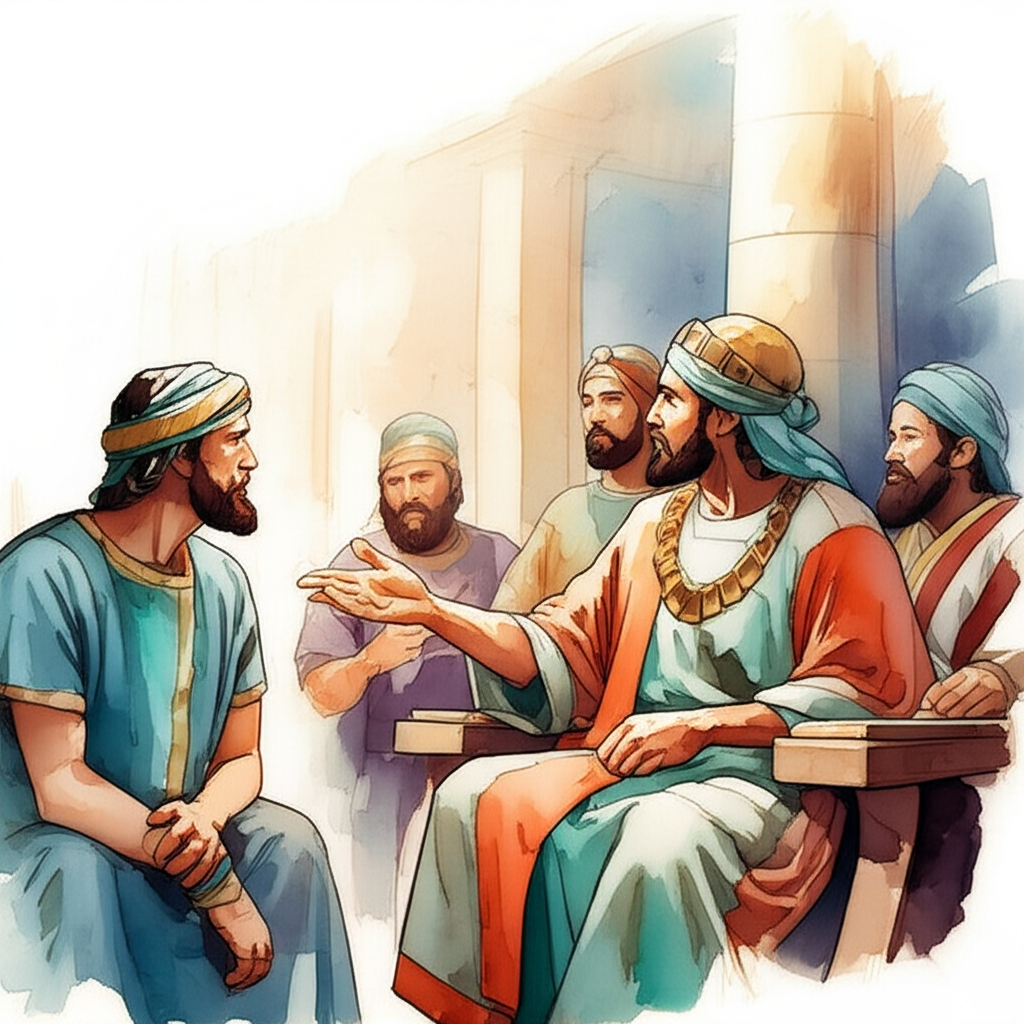
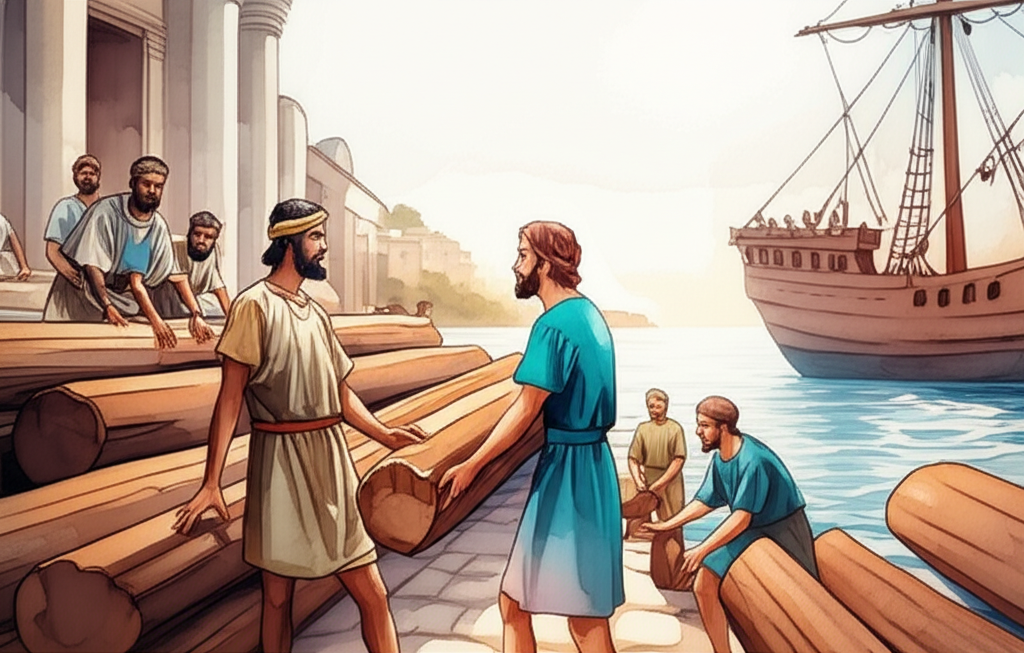
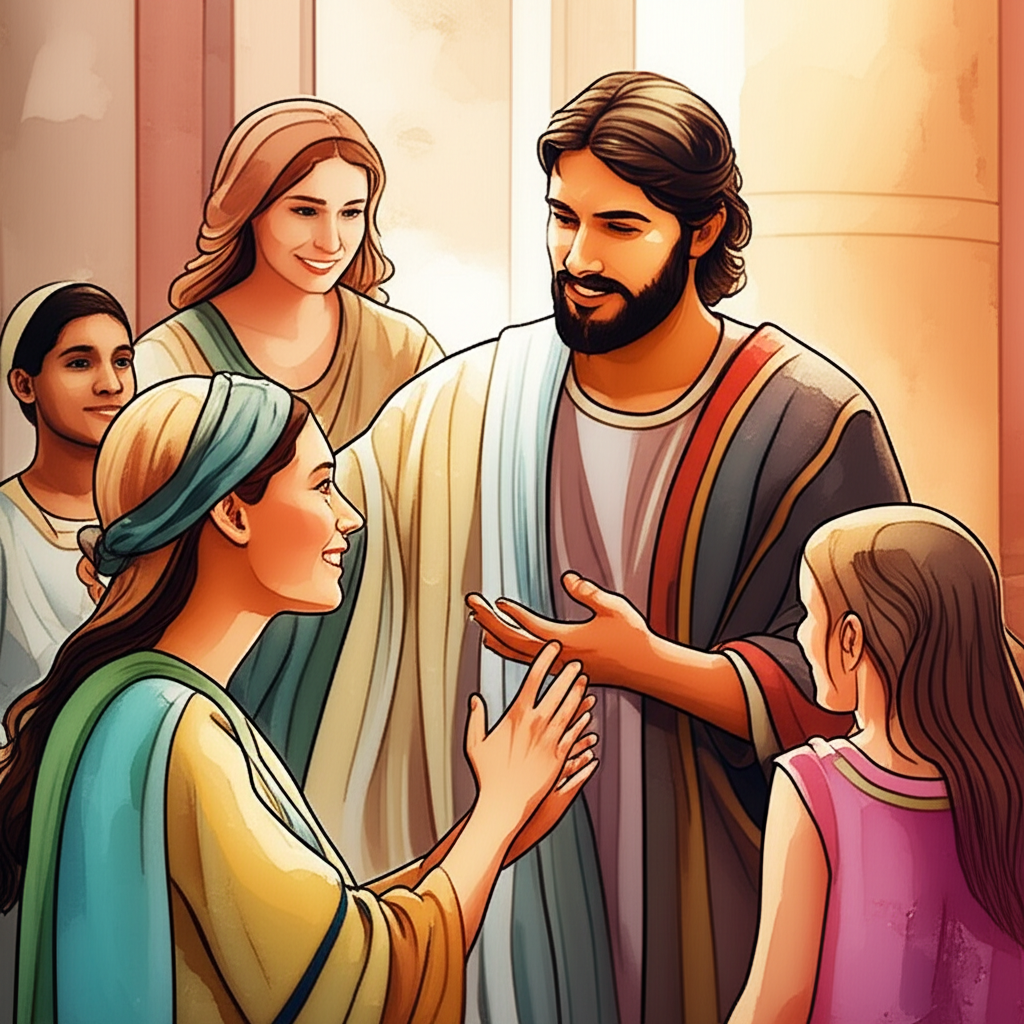

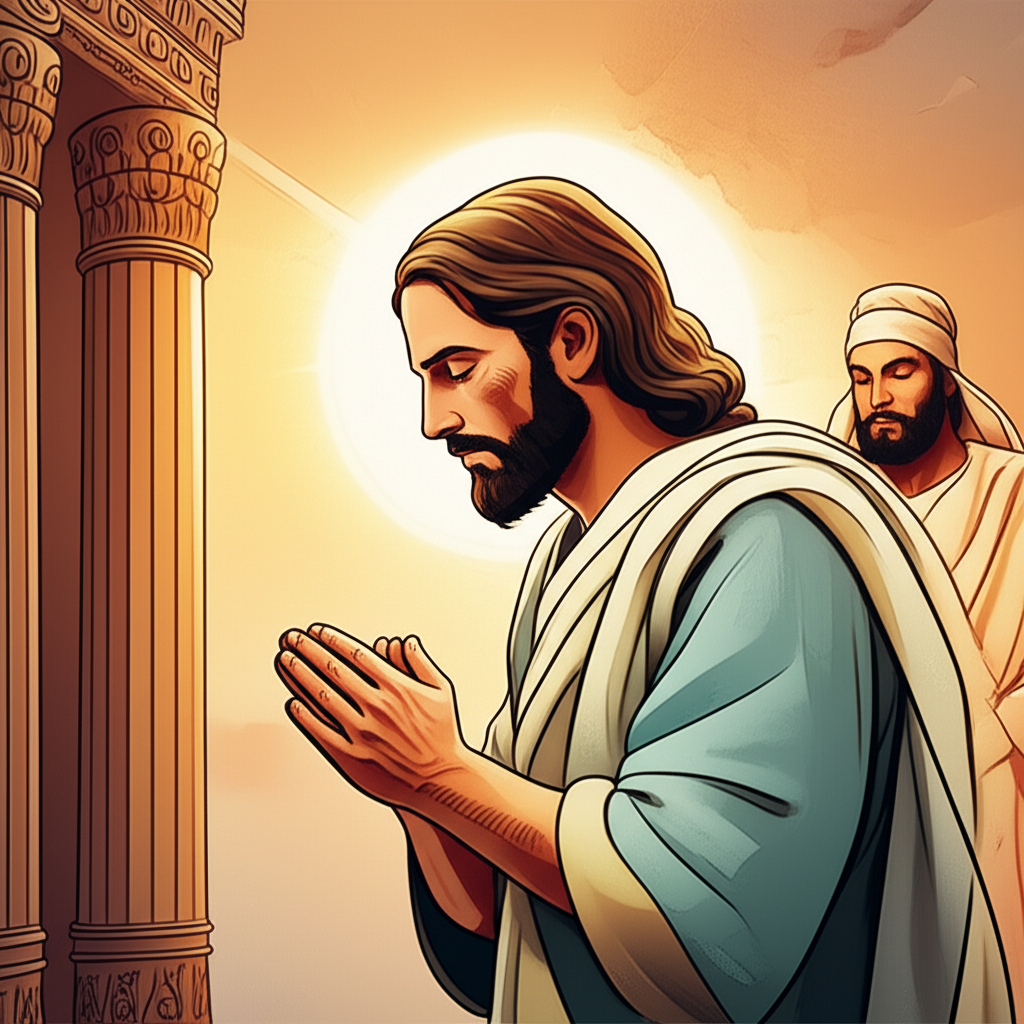


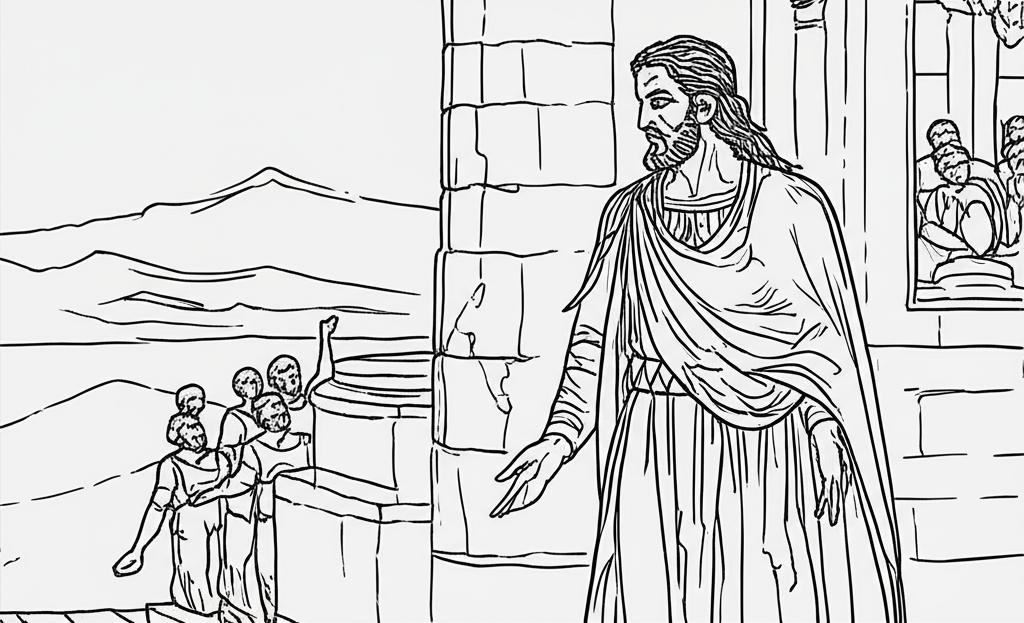

1 Chronicles chapter 14 kjv
- 1 Now Hiram king of Tyre sent messengers to David, and timber of cedars, with masons and carpenters, to build him an house.
- 2 And David perceived that the LORD had confirmed him king over Israel, for his kingdom was lifted up on high, because of his people Israel.
- 3 And David took more wives at Jerusalem: and David begat more sons and daughters.
- 4 Now these are the names of his children which he had in Jerusalem; Shammua, and Shobab, Nathan, and Solomon,
- 5 And Ibhar, and Elishua, and Elpalet,
- 6 And Nogah, and Nepheg, and Japhia,
- 7 And Elishama, and Beeliada, and Eliphalet.
- 8 And when the Philistines heard that David was anointed king over all Israel, all the Philistines went up to seek David. And David heard of it, and went out against them.
- 9 And the Philistines came and spread themselves in the valley of Rephaim.
- 10 And David inquired of God, saying, Shall I go up against the Philistines? And wilt thou deliver them into mine hand? And the LORD said unto him, Go up; for I will deliver them into thine hand.
- 11 So they came up to Baalperazim; and David smote them there. Then David said, God hath broken in upon mine enemies by mine hand like the breaking forth of waters: therefore they called the name of that place Baalperazim.
- 12 And when they had left their gods there, David gave a commandment, and they were burned with fire.
- 13 And the Philistines yet again spread themselves abroad in the valley.
- 14 Therefore David inquired again of God; and God said unto him, Go not up after them; turn away from them, and come upon them over against the mulberry trees.
- 15 And it shall be, when thou shalt hear a sound of going in the tops of the mulberry trees, that then thou shalt go out to battle: for God is gone forth before thee to smite the host of the Philistines.
- 16 David therefore did as God commanded him: and they smote the host of the Philistines from Gibeon even to Gazer.
- 17 And the fame of David went out into all lands; and the LORD brought the fear of him upon all nations.
1 Chronicles chapter 14 nkjv
- 1 Now Hiram king of Tyre sent messengers to David, and cedar trees, with masons and carpenters, to build him a house.
- 2 So David knew that the LORD had established him as king over Israel, for his kingdom was highly exalted for the sake of His people Israel.
- 3 Then David took more wives in Jerusalem, and David begot more sons and daughters.
- 4 And these are the names of his children whom he had in Jerusalem: Shammua, Shobab, Nathan, Solomon,
- 5 Ibhar, Elishua, Elpelet,
- 6 Nogah, Nepheg, Japhia,
- 7 Elishama, Beeliada, and Eliphelet.
- 8 Now when the Philistines heard that David had been anointed king over all Israel, all the Philistines went up to search for David. And David heard of it and went out against them.
- 9 Then the Philistines went and made a raid on the Valley of Rephaim.
- 10 And David inquired of God, saying, "Shall I go up against the Philistines? Will You deliver them into my hand?" The LORD said to him, "Go up, for I will deliver them into your hand."
- 11 So they went up to Baal Perazim, and David defeated them there. Then David said, "God has broken through my enemies by my hand like a breakthrough of water." Therefore they called the name of that place Baal Perazim.
- 12 And when they left their gods there, David gave a commandment, and they were burned with fire.
- 13 Then the Philistines once again made a raid on the valley.
- 14 Therefore David inquired again of God, and God said to him, "You shall not go up after them; circle around them, and come upon them in front of the mulberry trees.
- 15 And it shall be, when you hear a sound of marching in the tops of the mulberry trees, then you shall go out to battle, for God has gone out before you to strike the camp of the Philistines."
- 16 So David did as God commanded him, and they drove back the army of the Philistines from Gibeon as far as Gezer.
- 17 Then the fame of David went out into all lands, and the LORD brought the fear of him upon all nations.
1 Chronicles chapter 14 niv
- 1 Now Hiram king of Tyre sent messengers to David, along with cedar logs, stonemasons and carpenters to build a palace for him.
- 2 And David knew that the LORD had established him as king over Israel and that his kingdom had been highly exalted for the sake of his people Israel.
- 3 In Jerusalem David took more wives and became the father of more sons and daughters.
- 4 These are the names of the children born to him there: Shammua, Shobab, Nathan, Solomon,
- 5 Ibhar, Elishua, Elpelet,
- 6 Nogah, Nepheg, Japhia,
- 7 Elishama, Beeliada and Eliphelet.
- 8 When the Philistines heard that David had been anointed king over all Israel, they went up in full force to search for him, but David heard about it and went out to meet them.
- 9 Now the Philistines had come and raided the Valley of Rephaim;
- 10 so David inquired of God: "Shall I go and attack the Philistines? Will you deliver them into my hands?" The LORD answered him, "Go, I will deliver them into your hands."
- 11 So David and his men went up to Baal Perazim, and there he defeated them. He said, "As waters break out, God has broken out against my enemies by my hand." So that place was called Baal Perazim.
- 12 The Philistines had abandoned their gods there, and David gave orders to burn them in the fire.
- 13 Once more the Philistines raided the valley;
- 14 so David inquired of God again, and God answered him, "Do not go directly after them, but circle around them and attack them in front of the poplar trees.
- 15 As soon as you hear the sound of marching in the tops of the poplar trees, move out to battle, because that will mean God has gone out in front of you to strike the Philistine army."
- 16 So David did as God commanded him, and they struck down the Philistine army, all the way from Gibeon to Gezer.
- 17 So David's fame spread throughout every land, and the LORD made all the nations fear him.
1 Chronicles chapter 14 esv
- 1 And Hiram king of Tyre sent messengers to David, and cedar trees, also masons and carpenters to build a house for him.
- 2 And David knew that the LORD had established him as king over Israel, and that his kingdom was highly exalted for the sake of his people Israel.
- 3 And David took more wives in Jerusalem, and David fathered more sons and daughters.
- 4 These are the names of the children born to him in Jerusalem: Shammua, Shobab, Nathan, Solomon,
- 5 Ibhar, Elishua, Elpelet,
- 6 Nogah, Nepheg, Japhia,
- 7 Elishama, Beeliada and Eliphelet.
- 8 When the Philistines heard that David had been anointed king over all Israel, all the Philistines went up to search for David. But David heard of it and went out against them.
- 9 Now the Philistines had come and made a raid in the Valley of Rephaim.
- 10 And David inquired of God, "Shall I go up against the Philistines? Will you give them into my hand?" And the LORD said to him, "Go up, and I will give them into your hand."
- 11 And he went up to Baal-perazim, and David struck them down there. And David said, "God has broken through my enemies by my hand, like a bursting flood." Therefore the name of that place is called Baal-perazim.
- 12 And they left their gods there, and David gave command, and they were burned.
- 13 And the Philistines yet again made a raid in the valley.
- 14 And when David again inquired of God, God said to him, "You shall not go up after them; go around and come against them opposite the balsam trees.
- 15 And when you hear the sound of marching in the tops of the balsam trees, then go out to battle, for God has gone out before you to strike down the army of the Philistines."
- 16 And David did as God commanded him, and they struck down the Philistine army from Gibeon to Gezer.
- 17 And the fame of David went out into all lands, and the LORD brought the fear of him upon all nations.
1 Chronicles chapter 14 nlt
- 1 Then King Hiram of Tyre sent messengers to David, along with cedar timber, and stonemasons and carpenters to build him a palace.
- 2 And David realized that the LORD had confirmed him as king over Israel and had greatly blessed his kingdom for the sake of his people Israel.
- 3 Then David married more wives in Jerusalem, and they had more sons and daughters.
- 4 These are the names of David's sons who were born in Jerusalem: Shammua, Shobab, Nathan, Solomon,
- 5 Ibhar, Elishua, Elpelet,
- 6 Nogah, Nepheg, Japhia,
- 7 Elishama, Eliada, and Eliphelet.
- 8 When the Philistines heard that David had been anointed king over all Israel, they mobilized all their forces to capture him. But David was told they were coming, so he marched out to meet them.
- 9 The Philistines arrived and made a raid in the valley of Rephaim.
- 10 So David asked God, "Should I go out to fight the Philistines? Will you hand them over to me?" The LORD replied, "Yes, go ahead. I will hand them over to you."
- 11 So David and his troops went up to Baal-perazim and defeated the Philistines there. "God did it!" David exclaimed. "He used me to burst through my enemies like a raging flood!" So they named that place Baal-perazim (which means "the Lord who bursts through").
- 12 The Philistines had abandoned their gods there, so David gave orders to burn them.
- 13 But after a while the Philistines returned and raided the valley again.
- 14 And once again David asked God what to do. "Do not attack them straight on," God replied. "Instead, circle around behind and attack them near the poplar trees.
- 15 When you hear a sound like marching feet in the tops of the poplar trees, go out and attack! That will be the signal that God is moving ahead of you to strike down the Philistine army."
- 16 So David did what God commanded, and they struck down the Philistine army all the way from Gibeon to Gezer.
- 17 So David's fame spread everywhere, and the LORD caused all the nations to fear David.
- Bible Book of 1 Chronicles
- 1 Adam to Noah and Abraham
- 2 Lineage of King David Tribe of Judah
- 3 King David Children
- 4 Descendants of Judah
- 5 Descendants of Reuben
- 6 Sons of Levi The Priestly Line
- 7 Descendants of Issachar
- 8 A Genealogy of Saul
- 9 A Genealogy of the Returned Exiles
- 10 The Death of King Saul
- 11 David Anointed King
- 12 The Mighty Men Join David
- 13 The Ark Brought from Kiriath-Jearim
- 14 David's Wives and Children
- 15 The Ark Brought to Jerusalem
- 16 The Ark Placed in a Tent
- 17 The Lord's Covenant with David
- 18 David Defeats His Enemies
- 19 The Ammonites Disgrace David's Men
- 20 The Capture of Rabbah
- 21 David's Census Brings Pestilence
- 22 David Prepares for Temple Building
- 23 David Organizes the Levites
- 24 24 Courses of Priests
- 25 David Organizes the Musicians
- 26 Divisions of the Gatekeepers
- 27 Military Divisions
- 28 David's Charge to Israel
- 29 Offerings for the Temple